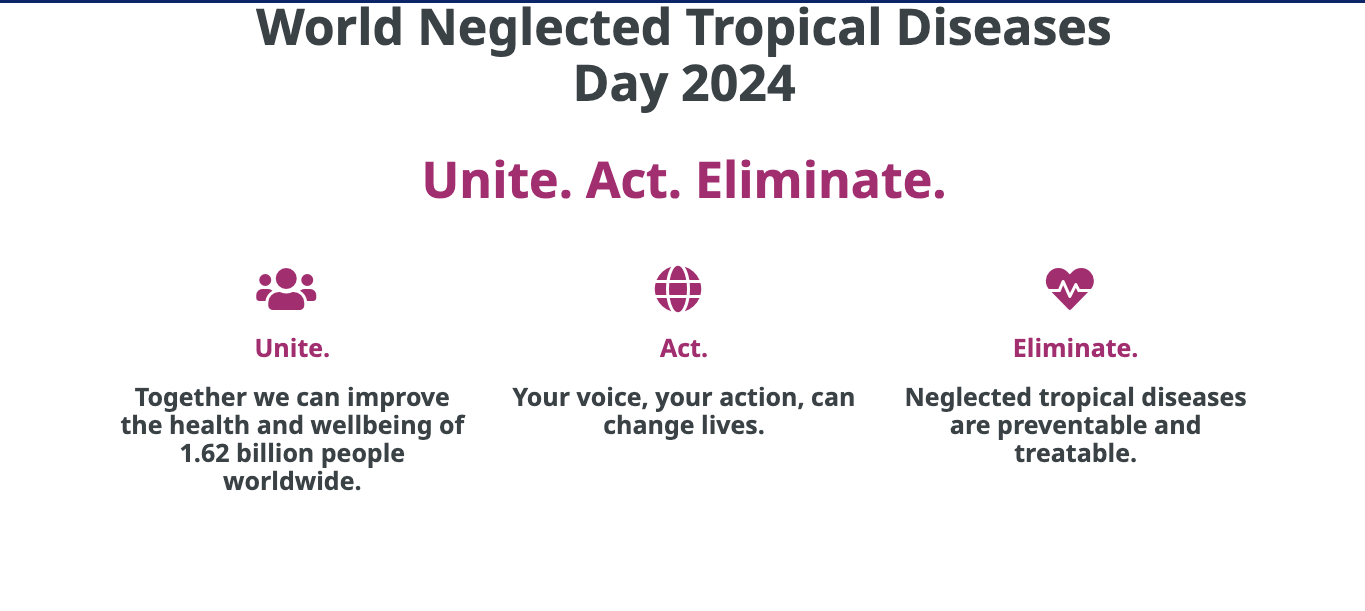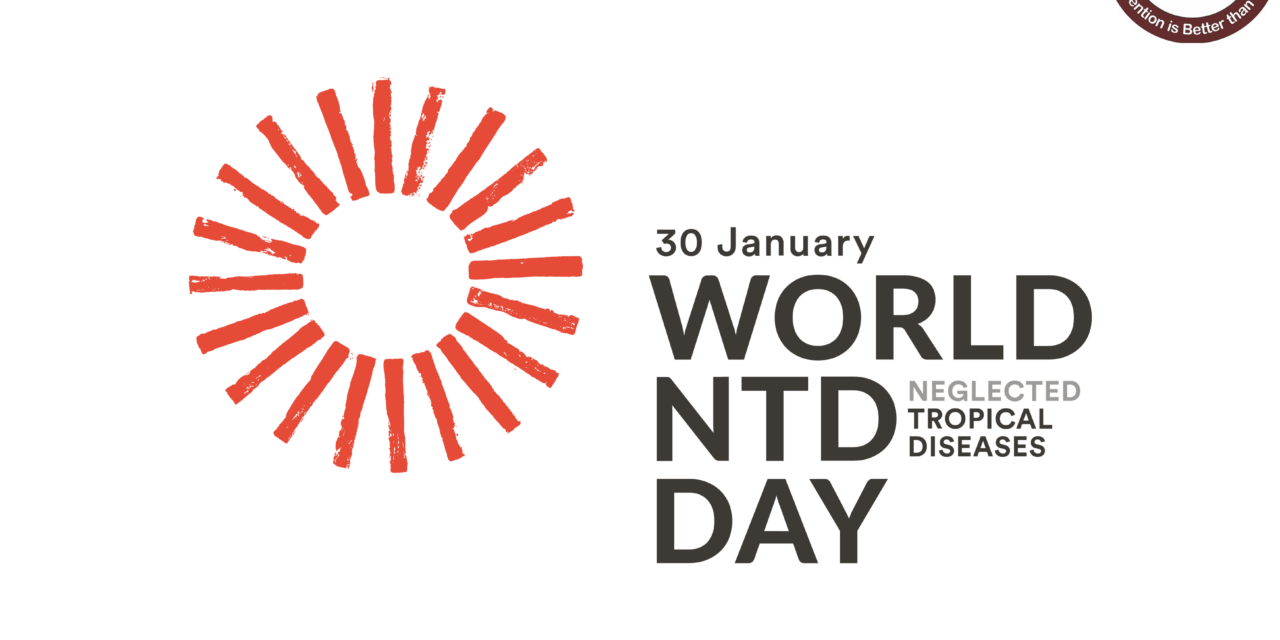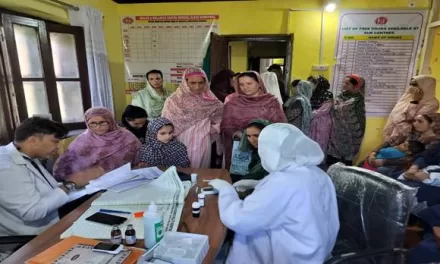World Neglected Tropical Diseases Day is observed every year on 30 January
On World Neglected Tropical Disease Day 2024, WHO is calling on everybody, including leaders and communities, to unite and act to address the inequalities that drive neglected tropical diseases (NTDs) and to make bold, sustainable investments to free the estimated 1.62 billion people, in the world’s most vulnerable communities, from a vicious cycle of disease and poverty.
The purpose of World Neglected Tropical Diseases Day is to raise the profile of neglected tropical diseases, the suffering they cause and to garner support towards their control, elimination and eradication, in line with the programmatic targets set out in the NTD road map 2021−2030 and the commitments of the 2022 Kigali declaration on neglected tropical diseases.
On 31 May 2021, the Seventy-fourth World Health Assembly recognized 30 January as World Neglected Tropical Diseases Day through the unanimous approval of decision WHA74(18) by WHO Member States. This Day is now one of the 11 Global Health Days and 2 Global Health Weeks recognized by WHO.

NTDs milestones through the years
1975
Establishment of TDR
WHO establishes and begins hosting the Special Programme for Research and Training in Tropical Diseases (TDR), which is co-sponsored by UNICEF, UNDP and the World Bank. As a global programme of scientific collaboration, TDR contributes to strengthening the research capacity of disease-affected countries, and to promoting the translation of evidence into interventions directed against diseases of poverty.
2003
First Berlin meeting on neglected tropical diseases
During the first historic Berlin meeting, experts trigger discussions aimed at changing WHO’s approach to tackling tropical diseases.
2005
Second Berlin meeting on neglected tropical diseases Establishment of WHO’s NTD programme
The second Berlin meeting sets the scene for a ‘paradigm shift’ – moving away from a traditional disease-centered approach to an integrated one, responding to the specific health needs of marginalized communities. In September, WHO creates the Department of Control of Neglected Tropical Diseases.
2007
First Global Partners’ Meeting on Neglected Tropical Diseases
In April, WHO hosts the First Global Partners’ Meeting on Neglected Tropical Diseases, heralding a close multi-stakeholder collaboration.
2008
First global plan for neglected tropical diseases
WHO publishes its Global Plan to Combat Neglected Tropical Diseases 2008–2015, detailing a vision, principles for action, challenges, goals and targets for 2008-2015, strategic areas for action and a framework for implementation, monitoring and evaluation.
2010
First Global NTD report
WHO publishes its ground-breaking, first global NTD Report and its 2011 update, triggering renewed and additional medicine and in-kind donations. The report is complemented by an update released the following year.
2012
First NTD road map
WHO publishes its first NTD road map with 2015 milestones and 2020 targets. Inspired by the road map, partners endorse the London Declaration committing renewed support to eliminating 10 NTDs.
2013
Sixty-sixth World Health Assembly
WHO’s decision making body – the World Health Assembly – passes Resolution 66.12 calling on countries to accelerate interventions to eliminate NTDs. WHO releases its second global report on neglected tropical diseases.
2015
A call to invest in NTDs
WHO releases its third global report on neglected tropical diseases, which introduces a key concept: as NTDs can be seen as a proxy for poverty, coverage of the public-health interventions implemented against NTDs may be interpreted as a proxy for universal health coverage and poverty reduction. Investing in NTDs can led to shared prosperity.
2016
A billion people are treated in a single year
For the first time NTD interventions reach a billion people within a year, of which 99% through preventive chemotherapy (mass treatment) and the rest through individual disease management – a trend that continued until 2019.
2017
Second Global Partners’ Meeting on Neglected Tropical Diseases
On 19 April, WHO hosts the Second Global Partners’ Meeting on Neglected Tropical Diseases amid unprecedented progress. Pledges of more than US$ 800 million dollars are made to accelerate interventions and maximize impact. On the same day, WHO releases it fourth report on NTDs.
2019
Highest coverage of NTD interventions
In the course of 2019, over 1.2 billion people are reached by interventions against NTDs, which overall deliver more than 1.6 billion treatments. Over two thirds of all the individuals requiring treatment for at least one NTD are reached through a range of community-based, school-based and health-facility-based services: the coverage is 66.9%, the highest ever reached.
2020
COVID-19 disrupts NTD programmes globally; The NTD road map 2021−2030 is published
On 30 January, WHO declares the outbreak of COVID-19 a public health emergency of international concern (PHEIC). Health programmes, including those for NTDs, are severely disrupted by the pandemic. In November, through Decision 73(33), the World Health Assembly endorses the second NTD road map 2021−2030 and urges Member States to implement it. Since then, eight road map companion documents have been published.
2021
World NTD Day is a global health day
In May, through Decision 74(18), the World Health Assembly establishes World NTD Day as a global health day, to be observed annually on 30 January. On this day in 2012, both the first NTD road map and the London Declaration had been launched.
2022
Declarations and Summits
The Abu Dhabi Declaration on the Eradication of Guinea Worm Disease is adopted on 23 March; major pledges are made during the Kigali Summit on Malaria and NTDs, and the Kigali Declaration is launched on 23 June.
2023
A year of accomplishments
2023 is marked by a number of events. In January, the WHO global report on neglected tropical diseases is released. In March, WHO convenes the first global meeting on skin NTDs. In June, the global NTD community meets in Geneva for the Global NTD Programme partners’ meeting. In December, major pledges to fight NTDs are made during the COP28 Health Day in Dubai. And just before the end of the year, noma is officially added to the list of NTDs.











